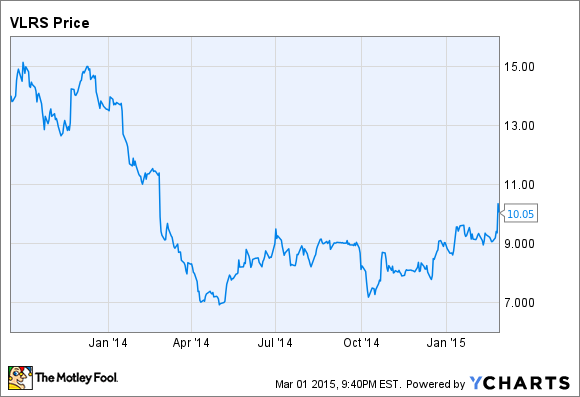Last week, a U.S. pension fund -- the DeKalb County Employees Retirement System -- sued Mexican budget airline Volaris (VLRS 3.54%). The fund lost money after buying stock in the Volaris IPO, and it blamed this on errors in financial statements from Volaris' IPO documents and management's failure to disclose key business headwinds.
In a few years, this lawsuit will probably be seen as another example of the shortsightedness that is all too common on Wall Street. First, the "problems" the lawsuit points to are already receding. Second, while it's true Volaris stock has declined since the IPO, it's not likely to stay down for long.
The lawsuit
Volaris completed its IPO in September 2013 at an offering price of $12. The stock quickly surged to around $15, but then it lost more than half its value in the span of just a few months, as profitability deteriorated.
Volaris Stock Chart, data by YCharts.
The pension fund's lawsuit largely rests on the claim that Volaris' management failed to notify potential investors about negative developments that reduced the company's earnings potential. The first of these was the move to a new reservation system, and the second was an increase in competition in two key markets: Guadalajara and Tijuana.
Within 24 hours of this lawsuit being filed, a host of law firms piled on with their own investigations and began rounding up Volaris investors for potential class action lawsuits.
Debunking the claims
Ironically, investors began lining up to sue Volaris just a day or two before it reported blowout results for Q4 2014. The company's operating margin soared 17 percentage points year over year last quarter: from -6.2% to 10.8%. This strong performance can be attributed in large part to the reversal of the two "negative developments" cited in the lawsuit.
First, it's true that the move to a new reservation system in the fall of 2013 caused some disruption, particularly related to ancillary revenue. However, it's quite typical for airlines to hit some turbulence upon switching to a new reservation system. The key is getting past those initial headwinds with no lasting damage.
It's becoming increasingly clear that Volaris succeeded in this respect. In Q3, non-ticket revenue per passenger rose 44% year over year. That growth rate accelerated to 61% in Q4. Excluding cargo, non-ticket revenue per passenger soared 86% last quarter.

Non-ticket revenue is soaring at Volaris.
Volaris CEO Enrique Beltranena attributed the strong growth in non-ticket revenue to -- surprise! -- the new reservation system. Now that Volaris has gotten past the initial teething problems, the new platform will contribute to Volaris' long-term unit revenue growth.
Second, the increased competition in Guadalajara and Tijuana referenced in the lawsuit is likely to be an equally temporary problem. On Volaris' recent earnings call, management noted that domestic capacity is declining in both Guadalajara and Tijuana as Volaris and other carriers adjust to the oversupply.
More broadly, Volaris is adjusting its route network. In 2015, Volaris plans to grow just 2%-4% in the domestic market, but 33%-36% in the international market, as it takes advantage of stronger demand in the U.S. (and the strong dollar). This will diversify Volaris' revenue base, as it deployed 74% of its capacity in the domestic market last year.
The big picture
So, what can we learn from this lawsuit? The main lesson is that short-term stock price swings don't say much about a company's long-run potential for earnings growth and stock price appreciation.
The pension fund may be technically right that it lost money because of the negative impact on profitability of the reservation system switch and overcapacity in Guadalajara and Tijuana.
But a year and a half is not enough time to evaluate the performance of a stock or the underlying business, especially in the volatile airline industry. The headwinds Volaris faced in the year after the IPO were short term in nature. By contrast, its main competitive advantage -- an extremely low-cost structure -- is not going away.
If Volaris keeps putting up results like its most recent quarterly report, the stock will probably be well above the IPO price in another year and a half, with plenty of room to run. If the DeKalb County Employees Retirement System really lost money in Volaris stock, its managers mainly have themselves to blame: They gave up on Volaris too soon.






